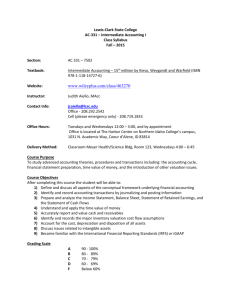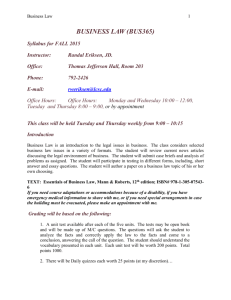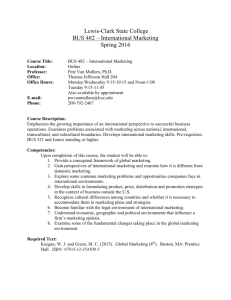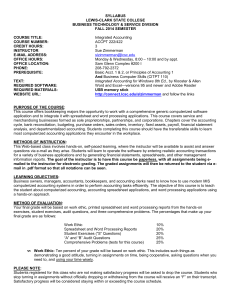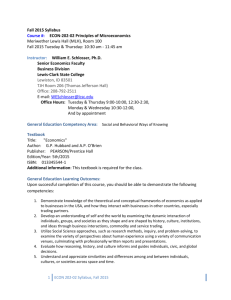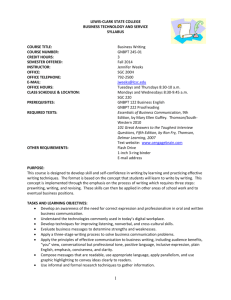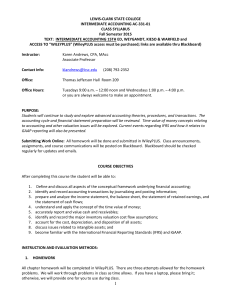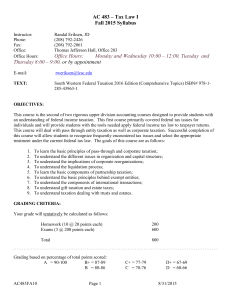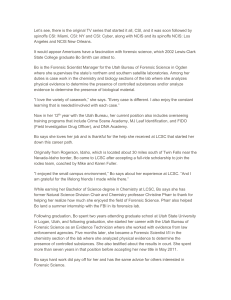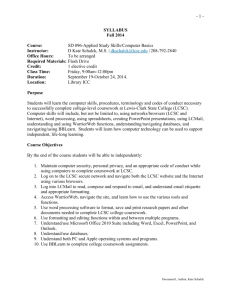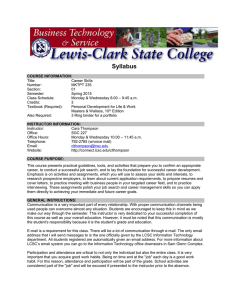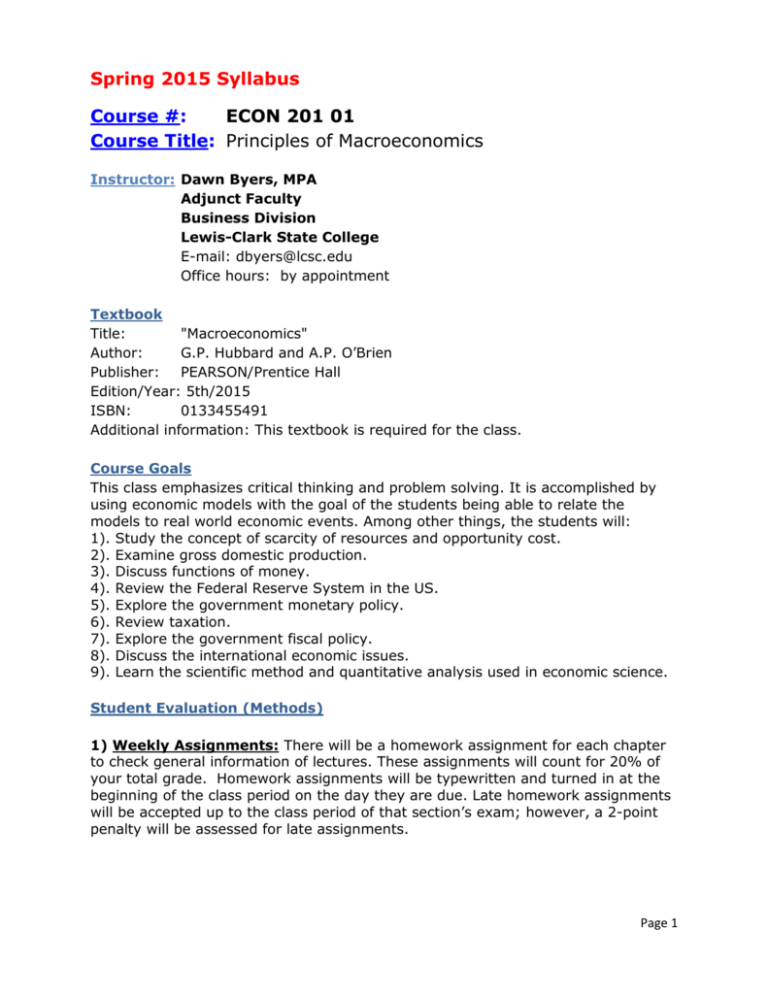
Spring 2015 Syllabus
Course #:
ECON 201 01
Course Title: Principles of Macroeconomics
Instructor: Dawn Byers, MPA
Adjunct Faculty
Business Division
Lewis-Clark State College
E-mail: dbyers@lcsc.edu
Office hours: by appointment
Textbook
Title:
"Macroeconomics"
Author:
G.P. Hubbard and A.P. O’Brien
Publisher:
PEARSON/Prentice Hall
Edition/Year: 5th/2015
ISBN:
0133455491
Additional information: This textbook is required for the class.
Course Goals
This class emphasizes critical thinking and problem solving. It is accomplished by
using economic models with the goal of the students being able to relate the
models to real world economic events. Among other things, the students will:
1). Study the concept of scarcity of resources and opportunity cost.
2). Examine gross domestic production.
3). Discuss functions of money.
4). Review the Federal Reserve System in the US.
5). Explore the government monetary policy.
6). Review taxation.
7). Explore the government fiscal policy.
8). Discuss the international economic issues.
9). Learn the scientific method and quantitative analysis used in economic science.
Student Evaluation (Methods)
1) Weekly Assignments: There will be a homework assignment for each chapter
to check general information of lectures. These assignments will count for 20% of
your total grade. Homework assignments will be typewritten and turned in at the
beginning of the class period on the day they are due. Late homework assignments
will be accepted up to the class period of that section’s exam; however, a 2-point
penalty will be assessed for late assignments.
Page 1
2) Weekly Assessments: There will be a quiz at the end of each chapter to check
general comprehension of the material in the textbook. These assessments will
count for 20% of your total grade. Quizzes cannot be made up except under very
special circumstances, so every effort should be made to attend class on quiz day.
3) Participation: This course requires students to involve themselves in class
discussions. Participation points will be based on in-class discussion, as well as
completion of homework assignments and quizzes. Participation points will count for
10% of your total grade.
4) Exams: Three examinations – Exam #1, 20% of total grade; Exam #2, 20% of
total grade; Exam #3, 10% of total grade. Exam #3 will be given during Finals
Week; permission to take Exam #3 prior to Finals Week will not be granted.
Grades (The letter grades for the course will based on the following overall
percentage received):
A
AB+
B
BC+
92-100
90-91
88-89
82-87
80-81
78-79
C
CD+
D
F
I
72-77
70-71
68-69
60-67
59 & below
See catalog
Every effort will be made by this instructor to return graded assignments, quizzes,
and exams on the first class period following their submission.
Class Schedule (One Chapter per Week)
Chapter 1 - Economics: Foundations and Models
Chapter 8 - GDP: Measuring Total Production and Income
Chapter 9 - Unemployment and Inflation
Chapter 10 - Economic Growth, the Financial System, and Business Cycles
Chapter 11 - Long-Run Economic Growth: Sources and Policies
First Exam – (20% of your total grade)
Chapter 13 - Aggregate Demand and Aggregate Supply Analysis
Chapter 14 - Money, Banks, and the Federal Reserve System
Chapter 15 - Monetary Policy
Chapter 16 - Fiscal Policy
Chapter 17 - Inflation, Unemployment, and Federal Reserve Policy
Second Exam – (20% of your total grade)
Chapter 18 - Macroeconomics in an Open Economy
Chapter 19 – The International Financial System
Third Exam – Finals Week (10% of your total grade)
Page 2
Syllabus Addendum
Consumer Information
In 2008, the federal government required all post-secondary institutions offering federal financial aid
programs to provide key data to both prospective and current students. To comply with this requirement,
Lewis-Clark State College has developed a consumer information page, which may be accessed at
http://www.lcsc.edu/student-consumer-information/
Disability Accommodations
Students requiring special accommodations or course adaptations due to a disability and/or a healthrelated issue should consult their course instructors and the LCSC Student Counseling Center
immediately (RCH 111, 792-2211). Official documentation may be required in order to provide an
accommodation and/or adaptation.
Student Rights and Responsibilities
Students have the responsibility for knowing their program requirements, course requirements, and other
information associated with their enrollment at LCSC. Students should review the LCSC General Catalog
(http://webdev.lcsc.edu/catalog and the LCSC Student Handbook
(http://www.lcsc.edu/media/1152314/13-14-Student-Handbook-Revised.pdf) for more information.
Accidents/Student Insurance
Students participating in LCSC classes normally must look to their personal health insurance policy
(Student Health Insurance Plan or comparable private coverage) should an accident occur. In the event
of an accident, please seek medical help, if necessary, and report the incident to LCSC Security (7922226). Fieldtrips or other special student activities may also require students to submit a signed
participation waiver (forms can be obtained from the supporting Division Office).
Enrollment Verification/Attendance
Students who are not actively pursuing their classes may have to repay part or all of their financial aid
awards depending upon the circumstances.
Academic Dishonesty
Academic dishonesty, which includes cheating and plagiarism, is not tolerated at LCSC. Individual faculty
members will impose their own policies and sanctions regarding academic dishonesty. Students who are
accused of being academically dishonest may be referred to the VP for Student Affairs for official
disciplinary action.
Illegal File Sharing
Students using LCSC’s computers and/or computer network must comply with the college’s appropriate
use policies and are prohibited from illegally downloading or sharing data files of any kind. Specific
information about the college’s technology policies and its protocols for combating illegal file sharing may
be found on the VP for Student Affairs’ web page (http://www.lcsc.edu/student-affairs/student-code-ofconduct/ ).
Diversity Vision Statement
Regardless of race, color, age, sex, religion, national origin, disability, veteran status, or sexual
orientation, you will be treated and respected as a human being.
Disclosures
During this course, if you elect to discuss information with me which you consider to be sensitive or
personal in nature and not to be shared with others, please state this clearly. Your confidentiality in these
circumstances will be respected unless upholding that confidentiality could reasonably put you, other
students, other members of the campus community, or me in danger. In those cases or when I am bound
by law to report what you have told me, such as incidents involving sexual assault or other violent acts, I
will submit a report to appropriate campus authorities.
Page 3
CPC Worksheet
Component
Hours
A.
Accounting (ACT)
0
B.
Marketing (MKT)
0
C.
Finance (FIN)
0
D.
Management
1.
Management Principles (MGT)
0
2.
Organizational Behavior (OB)
0
3.
Human Resource Management (HRM)
0
4.
Operations Management (OM)
0
Total Management
E.
Economic/Social/Legal Environment
1.
Legal Environment of Business (LAW)
2.
Economics (ECN)
3.
Business Ethics (ETH)
Total Economic/Social/Legal Environment
F.
0
0
42
0
42
Decision-Support Tools
1.
Information Systems (IS)
2.
Quantitative Methods/Statistics (QM)
0
1.5
Total Decision-Support Tools
1.5
G.
Global Dimensions of Business (GLOB)
1.5
H.
Integrative Experience (INT)
Total Contact Hours
0
45
Page 4

